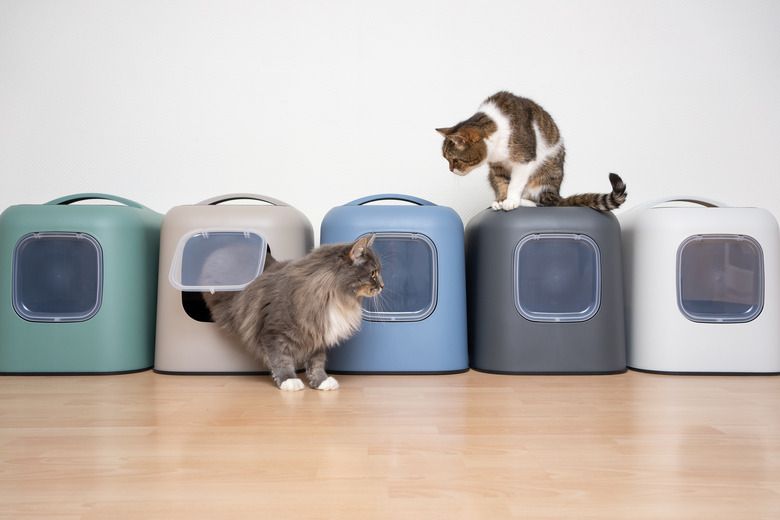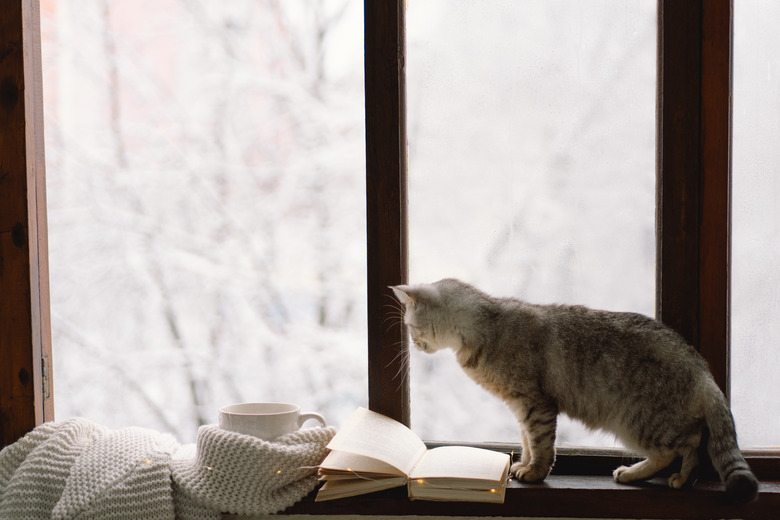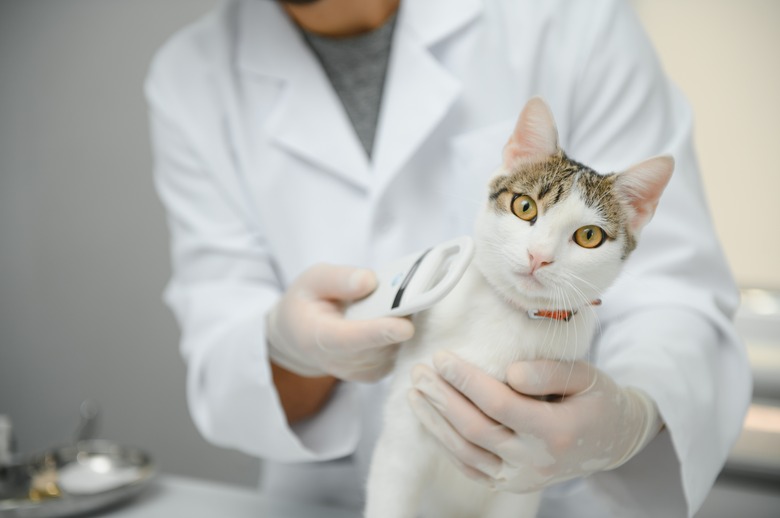A Veterinarian Walks You Through Safe Home Remedies For Cat Diarrhea
Cleaning the litter box isn't much fun, but there is an up side to it: You get a close look at your cat's health, partly by paying attention to their feces. If you're surprised to see signs that your cat's experiencing a bit of diarrhea, you can wait a day or two to see if they get through it. But waiting should only be done if your cat is acting normally, eating properly, and drinking as usual. Home remedies, such as a bland diet, can be tried, but if the diarrhea doesn't clear up in two days, you should take your cat to a veterinarian. If at any point your pet is lethargic, acting sick, or eating or drinking less (or not at all), they need to be examined by a DVM right away.
What is cat diarrhea?
What is cat diarrhea?
Diarrhea is a large amount of loose, unformed stool occurring more often than normal. Diarrhea isn't an illness but is a symptom that something isn't quite right. Usually, a cat's gastrointestinal tract is inflamed when they're suffering from diarrhea potentially caused by a bacterial or viral infection, parasites, or even a toxin. If they have a food intolerance to something in their diet, that may spur a bout of diarrhea.
What causes diarrhea in cats?
What causes diarrhea in cats?
There are many possible causes for diarrhea in cats, ranging from a new food to something more serious, such as cancer. Causes include:
- Abrupt changes in your cat's diet
- Food allergies
- Inflammatory bowel disease
- Intestinal parasites, such as Giardia or tapeworms (which they get from fleas)
- Cancer, such as lymphoma
- Thyroid disease
- Liver disease
- Immune system issues
- Bacterial infections
- Viral infections, such as panleukopenia
- Hairballs
- Foreign body in the gastrointestinal tract
Cat diarrhea symptoms
Cat diarrhea symptoms
Cat diarrhea may show up as one or more of the following:
- Loose stools
- Frequent defecation
- Bloody stool
- Black or tarry stool
- Watery stool
- Straining to poop
If your cat has any of these symptoms, your veterinarian will do a physical exam, fecal testing, and possibly blood tests and X-rays. If your pet has chronic diarrhea, they may need cat food designed for a sensitive digestive system or a hypoallergenic food. Your veterinarian will advise you on appropriate treatment, which may also include deworming.
Home remedies to treat cat diarrhea
Home remedies to treat cat diarrhea
Aside from the obvious problems in the litter box, if your cat seems to be their normal, happy self, you can try to firm things up for them on your own. It's also good to note that you should never withhold food from a cat. Doing so can cause a serious condition called hepatic lipidosis.
Feed your cat a bland diet
A homemade bland diet consists of plain white rice and plain, boiled, skinless chicken breast. Feed small amounts three to four times a day for three to five days. As the diarrhea starts clearing up, start mixing in your cat's regular food. An alternative to chicken and rice is a bland canned cat food designed for gastrointestinal upset. This can be found at your veterinarian's office.
Keep your cat hydrated
Encourage drinking by adding water to your cat's food or by adding low-sodium chicken broth to your cat's water bowl. Make sure the broth doesn't contain onions, garlic, or spices. If your cat vomits, seek veterinary care immediately.
Keep your cat clean
Make sure your cat's hind end stays clean. Medium- and long-haired cats are particularly prone to having their fluff soiled with feces underneath the tail and on their back legs. You can use unscented baby wipes if just the ends of the fur are dirty. But if diarrhea is on the skin, bathe your cat's hind end so their skin doesn't get scalded by fecal matter.
Try probiotics
There are probiotics formulated specially for cats that are available over the counter. If you're unsure of what to get, you can also purchase a probiotic from your veterinarian.
When to call the veterinarian
When to call the veterinarian
Though an occasional, short bout of diarrhea may not be cause for alarm, there is a point when you should call the veterinarian. Seek veterinary attention right away when your cat has diarrhea and exhibits any of the following symptoms:
- Appears to be in pain
- Vomiting
- Profuse, frequent, bloody, or very watery diarrhea
- Black or tarry poop
- Pale or yellow gums
- Dehydration, depression, or fever
If your cat is geriatric, has underlying medical conditions, is a kitten, or hasn't had all of their vaccinations or if you suspect they've ingested something potentially harmful, you should also seek veterinary treatment for their diarrhea.
If the diarrhea worsens or persists for more than 48 hours, it's also time to have your cat examined by a veterinarian. At this point, your cat may be getting dehydrated, even if they are drinking water.
Can I give my cat over-the-counter medicine for diarrhea?
Can I give my cat over-the-counter medicine for diarrhea?
No, you should not give over-the-counter anti-diarrheal medications because these products can be toxic to cats. Some human medications can cause electrolyte imbalance. Others may slow down the movement of digested material through the intestines, and depending on the cause, this is not always appropriate for a cat with diarrhea. Medications like Kaopectate may contain potentially toxic ingredients. Cat owners should talk with their veterinarian before giving products like Metamucil because too much may worsen diarrhea or cause constipation.
The bottom line
The bottom line
There are many causes of diarrhea in cats, ranging from changes in diet to intestinal parasites or cancer. If your cat's stool is bloody or tarry or if they are having very frequent bowel movements, are not feeling well, and are not eating or drinking normally, take them to your DVM right away. For mild cases of diarrhea where your cat is still eating and acting normally, pet owners can try a bland diet for two days.


